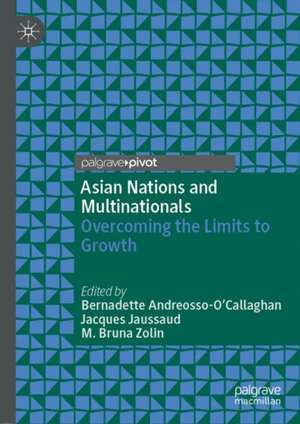Asian Nations and Multinationals: Overcoming the Limits to Growth
Editat de Bernadette Andreosso-O’Callaghan, Jacques Jaussaud, M. Bruna Zolinen Limba Engleză Hardback – 5 dec 2018
This edited collection focuses on the policies – at the macroeconomic level – and strategies – at the micro-meso economic levels – that need to be deployed in orderto overcome the limits to growth in a post-global financial crisis and export-led growth context. It will be of interest to all scholars of economics, management and the political sciences who work on the economies of East Asia, and also to all those who work on the theme of 'transition economies'.
Preț: 392.75 lei
Nou
Puncte Express: 589
Preț estimativ în valută:
75.18€ • 81.69$ • 63.19£
75.18€ • 81.69$ • 63.19£
Carte tipărită la comandă
Livrare economică 21 aprilie-05 mai
Preluare comenzi: 021 569.72.76
Specificații
ISBN-13: 9783030009120
ISBN-10: 3030009122
Pagini: 172
Ilustrații: XXIV, 205 p. 20 illus., 13 illus. in color.
Dimensiuni: 148 x 210 mm
Greutate: 0.53 kg
Ediția:1st ed. 2018
Editura: Springer International Publishing
Colecția Palgrave Pivot
Locul publicării:Cham, Switzerland
ISBN-10: 3030009122
Pagini: 172
Ilustrații: XXIV, 205 p. 20 illus., 13 illus. in color.
Dimensiuni: 148 x 210 mm
Greutate: 0.53 kg
Ediția:1st ed. 2018
Editura: Springer International Publishing
Colecția Palgrave Pivot
Locul publicării:Cham, Switzerland
Cuprins
Chapter 1: Introduction.- Part I: Trade Issues and International Business Strategies.- Chapter 2: Free Trade Agreements and Responsible Business: Examples from the EU’s Bilateral Agreements in East and Southeast Asia.- Chapter 3: Control and Coordination of Chinese Subsidiaries in France.- Chapter 4: Understanding the Evolution of the World Trade Network: An Analytic Network Process Framework.- Part II: International Trade, Agriculture, Food Supply and Sustainable Development.- Chapter 5: EU Enlargement: The Impact on Agricultural and Food Exports from Selected Asian Countries to the EU market – A Gravity Approach.- Chapter 6: Asian Palm Oil Production and Vegetable Oil Market: What can we Learn in terms of Sustainability?.- Chapter 7: Does Knowledge Interaction with Universities Enhance Firms’ Innovative Capabilities?: Evidence from the Food-Processing Industry in Thailand.- Part III: Firms and Societies in Asia Facing New Challenges.- Chapter 8: The Great East Japan Earthquake’s Effects on Electric Power Companies Financial Situation.- Chapter 9: Impact of the Trump Administration on the Economies of the Greater China Region.- Chapter 10: Microfinance in South-East Asia: The Case of Vietnam over the Period 2005-2015.- Chapter 11: Staffing of French MNCs in Asia: The Roles of Long-Term Expatriates versus Short-Term Assignees.- Chapter 12: Overall conclusion.
Notă biografică
Bernadette Andreosso-O’Callaghan is Jean Monnet Professor of Economics at the University of Limerick, Republic of Ireland and International Research Fellow at the Ruhr-University Bochum, Germany.
Jacques Jaussaud is Professor of Management at the University of Pau and Pays de l’Adour, France.
M. Bruna Zolin is Professor at Ca’ Foscari University, Department of Economics, Venice, Italy.
Jacques Jaussaud is Professor of Management at the University of Pau and Pays de l’Adour, France.
M. Bruna Zolin is Professor at Ca’ Foscari University, Department of Economics, Venice, Italy.
Textul de pe ultima copertă
Although Asia has been the world engine of economic growth since World War II, growth rates have differed sharply among the countries of the region. Still, all Asian countries have experienced some degree of growth limitation. Japan is facing the crucial issue of a quickly aging and shrinking population, a situation that South Korea is bound to face in the near future too. China, which still enjoys relatively high growth rates, is dealing with an exhaustion of its export-led growth model based on low wages, as well as huge and unprecedented environmental problems. In addition, food supply is still a concern for most Asian countries in spite of huge increases in productivity in the agricultural sector, the main reason being that global demand for food products has been increasing at an even higher speed.
This edited collection focuses on the policies – at the macroeconomic level – and strategies – at the micro-meso economic levels – that need to be deployed in orderto overcome the limits to growth in a post-global financial crisis and export-led growth context. It will be of interest to all scholars of economics, management and the political sciences who work on the economies of East Asia, and also to all those who work on the theme of 'transition economies'.
Bernadette Andreosso-O’Callaghan is Jean Monnet Professor of Economics at the University of Limerick, Republic of Ireland and International Research Fellow at the Ruhr-University Bochum, Germany.
Jacques Jaussaud is Professor of Management at the University of Pau and Pays de l’Adour, France.
M. Bruna Zolin is Professor at Ca’ Foscari University, Department of Economics, Venice, Italy.
This edited collection focuses on the policies – at the macroeconomic level – and strategies – at the micro-meso economic levels – that need to be deployed in orderto overcome the limits to growth in a post-global financial crisis and export-led growth context. It will be of interest to all scholars of economics, management and the political sciences who work on the economies of East Asia, and also to all those who work on the theme of 'transition economies'.
Bernadette Andreosso-O’Callaghan is Jean Monnet Professor of Economics at the University of Limerick, Republic of Ireland and International Research Fellow at the Ruhr-University Bochum, Germany.
Jacques Jaussaud is Professor of Management at the University of Pau and Pays de l’Adour, France.
M. Bruna Zolin is Professor at Ca’ Foscari University, Department of Economics, Venice, Italy.
Caracteristici
Outlines the current landscape of Asia in geo-economic and geo-political terms Offers solutions to known barriers to growth for Asian nations Split into three parts on trade issues, agriculture, and firms, respectively
